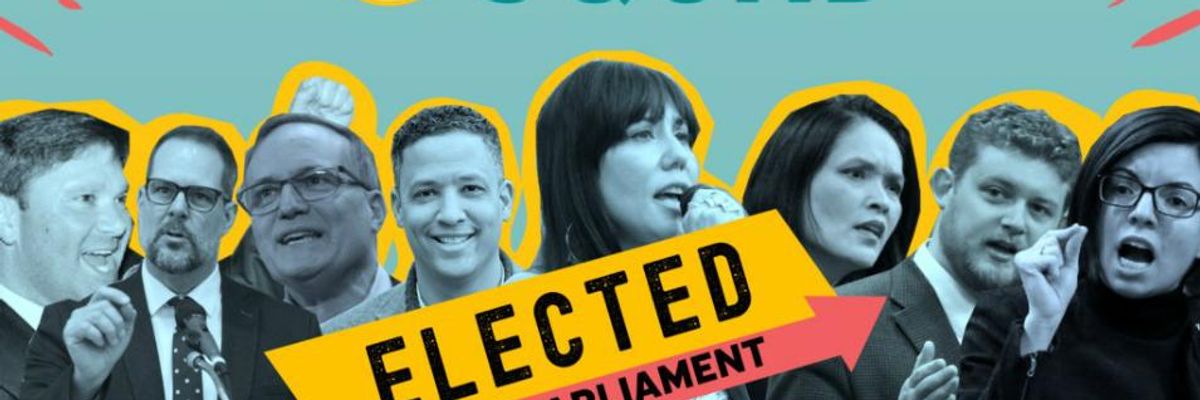Taking stock of the results from Monday's national elections in Canada, in which Liberal Prime Minister Justin Trudeau clung to power but lost a majority in Parliament, climate campaigners are treating the victories of eight progressive candidates who ran on a bold Green New Deal for the country as a crucial opportunity.
Canadian author and activist Naomi Klein tweeted that "Liberals lost their majority and will be pushed by a new squad of climate champions--on the inside and outside--demanding a #GreenNewDeal."
In May, a coalition of Canadian youth, artists, workers, Indigenous peoples, scientists, and faith leaders--including more than 60 organizations, unions, and associations--launched a Pact for a Green New Deal.
That followed the launch of Our Time, a non-partisan campaign backed by international environmental group 350.org and local hubs across the country that urged voters to support candidates who endorsed a Green New Deal. Eight Our Time candidates were elected Monday, according to the campaign.
The winners backed by Our Time were Leah Gazan, Don Davies, Peter Julian, Jenny Kwan, Niki Ashton, Daniel Blaikie, Alexandre Boulerice, and Matthew Green.
Following their victories Monday night, Our Time circulated a petition to "call on MPs from across the political spectrum to come together to form a government that will tackle the climate crisis and growing inequality, that will respect Indigenous rights, and create millions of good jobs."
Moving forward, "Trudeau will not form a formal coalition with any of the three smaller parties in Canada. Instead he will rely on their support on a vote-by-vote basis," according toThe New York Times. The country's four main parties are the Liberals, Conservatives, New Democrats, and Bloc Quebecois.
The progressive New Democratic Party, led by Jagmeet Singh, "started the campaign with 39 seats, sitting in third place," reported CBC. "As election night came to a close, the party's caucus had shrunk to roughly 24 seats, according to CBC's projections, leaving it behind the Bloc Quebecois," which promotes Quebec nationalism and sovereignty.
Trudeau, the 47-year-old son of late former Prime Minister Pierre Elliott Trudeau, became leader of the Liberal party in 2013 and prime minister in 2015. Since then, the Liberals have had a definitive majority in Canada's House of Commons, but are now set to lose about 30 seats in the wake of Monday's election.
"The Liberals lost support in every province across Canada in yesterday's federal election, and it cost them their majority government. But it wasn't enough to cost them power," CBC reported early Tuesday. "Trudeau will remain prime minister because voters in Quebec and Ontario didn't want to give the job to Conservative Leader Andrew Scheer."
This year's race between the Liberals and Conservatives grew closer in the run-up to the election as Trudeau faced a corruption scandal as well as revelations that he dressed in brownface and blackface makeup multiple times several years ago. Trudeau apologized for the costumes, denounced his past actions as "racist," and said he "deeply" regretted them.
"In recent years, Justin Trudeau has positioned himself as a champion of progressivism in the era of Donald Trump and the ascent of far-right populism in Europe," noted NBC News. "He has welcomed Syrian refugees, pushed for gender parity in Cabinet positions, legalized assisted suicide and vowed to tackle gun violence, among other rebuttals to the rightward tide through much of the West."
However, as Canada's head of government the over past four years, Trudeau has elicited intense criticism for his climate record, especially since he announced last year that the government would buy Kinder Morgan's Trans Mountain pipeline despite concerns about specific dangers of that pipeline's delayed expansion project as well as broader worries about the mounting threats of the climate crisis.
As Common Dreams reported in April, a study commissioned by the government found that Canada is warming twice as fast as the rest of the world--findings that CBC News columnist Neil Macdonald said at the time "should inspire naked fear."
Based on the election results, it's possible that growing fears about the climate crisis did influence voters Monday. In an op-ed for Common Dreams Tuesday, Canadian journalist and novelist Gary Engler pointed out that "the only political party that denies climate change is caused by humans won less than two percent of the vote despite its high profile leader, former Conservative cabinet minister Maxime Bernier."
"The anti-immigrant, right wing People's Party of Canada, formed by a self-described libertarian after he narrowly lost the vote to become Conservative leader, failed to elect even a single member of Parliament," Engler explained. "The four parties that do offer climate action plans (of varying seriousness) collected almost 65 percent of the vote."

